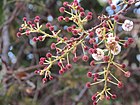Note: This is a project under development. The articles on this wiki are just being initiated and broadly incomplete. You can Help creating new pages.
Difference between revisions of "Acacia concinna - Bahuphenarasa"
(→Leaf) |
(→References) |
||
| Line 54: | Line 54: | ||
<references> | <references> | ||
<ref name="chemical composition">[https://en.wikipedia.org/wiki/Acacia_concinna "wikipedea"]</ref> | <ref name="chemical composition">[https://en.wikipedia.org/wiki/Acacia_concinna "wikipedea"]</ref> | ||
| − | <ref name="Leaf">[http:// | + | <ref name="Leaf">[http://florakarnataka.ces.iisc.ac.in/hjcb2/herbsheet.php?id=1850&cat=1 "Herbarium JCB"]</ref> |
<ref name="How to plant/cultivate">[https://pfaf.org/user/Plant.aspx?LatinName=Acacia+concinna "bimbima"]</ref> | <ref name="How to plant/cultivate">[https://pfaf.org/user/Plant.aspx?LatinName=Acacia+concinna "bimbima"]</ref> | ||
</references> | </references> | ||
Revision as of 12:02, 4 April 2019
Bahuphenarasa is a climbing shrub native to Asia, common in the warm plains of central and south India. It is commonly called as shikakai, Acacia hooperiana, Mimosa concinna etc. It's fruit is know as shikakai in India and ಸಿಗೆಕಾಯಿ in kannada. It is one of the good herbal remedy for hair.
Contents
Uses
Black fever, Malaria, Diabetes, Chronic cough, Asthmetic obstruction, Jaundice.
Parts Used
Chemical Composition
In commercial extracts, when the plant is hydrolyzed it yields lupeol, spinasterol, acacic acid, lactone, and the natural sugars glucose, arabinose and rhamnose. It also contains hexacosanol, spinasterone, oxalic acid, tartaric acid, citric acid, succinic acid, ascorbic acid, and the alkaloids calyctomine and nicotine.[1]
Common names
| Language | Common name |
|---|---|
| Kannada | Sheegae, Shige kayi, Sigeballi |
| Hindi | Kochi, Reetha |
| Malayalam | Cheeyakayi, Chinik-kaya, Shikai, Cheenikka |
| Tamil | Shika, Sheekay, Chikaikkai |
| Telugu | Cheekaya, Chikaya, Gogu |
| Marathi | NA |
| Gujarathi | NA |
| Punjabi | NA |
| Kashmiri | NA |
| Sanskrit | Aaavartaki |
| English | Shikakai, Soap-pod |
Habit
Identification
Leaf
| Kind | Shape | Feature |
|---|---|---|
| bipinnate | oblong | Pinnae 4-7 pairs, 4cm long; 20-25 pairs, 8 x 1.7mm |
.[2]
Flower
| Type | Size | Color and composition | Stamen | More information |
|---|---|---|---|---|
| bisexual | 5cm long | cream or white | 5-20 | Flower buds are purple or dark red, Plants flower throughout the year. |
Fruit
| Type | Size | Mass | Appearance | Seeds | More information |
|---|---|---|---|---|---|
| short legume | 5-8 cm | Fruit are on trees from February to March | The seedpods are widely used as a soap substitute in India | 7 seeds | {{{6}}} |
Other features
List of Ayurvedic medicine in which the herb is used
- Vishatinduka Taila as root juice extract
Where to get the saplings
Mode of Propagation
How to plant/cultivate
Acacia concinna can be grown from seeds. The seedlings can be transplanted. [3]
Commonly seen growing in areas
Photo Gallery
References
External Links
- Ayurvedic Herbs known to be helpful to treat Black fever
- Ayurvedic Herbs known to be helpful to treat Malaria
- Ayurvedic Herbs known to be helpful to treat Diabetes
- Ayurvedic Herbs known to be helpful to treat Chronic cough
- Ayurvedic Herbs known to be helpful to treat Asthmetic obstruction
- Ayurvedic Herbs known to be helpful to treat Jaundice
- Herbs with Fruits used in medicine
- Herbs with Bark used in medicine
- Herbs with Leaves used in medicine
- Herbs with common name in Kannada
- Herbs with common name in Hindi
- Herbs with common name in Malayalam
- Herbs with common name in Tamil
- Herbs with common name in Telugu
- Herbs with common name in Sanskrit
- Herbs with common name in English
- Habit - A large climbing shrub
- Index of Plants which can be propagated by Seeds
- Herbs that are commonly seen in the region of Tropical area
- Herbs




